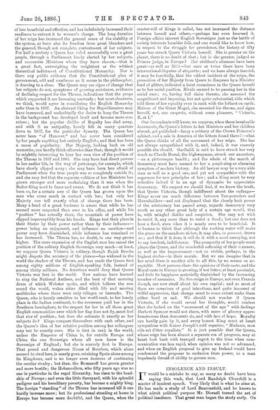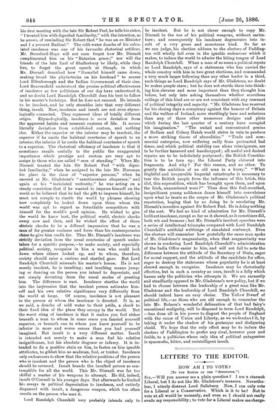INSOLENCE AND INSULT.
T-T would be a tnistake to say, as many no doubt have been saying this week, that Lord Randolph Churchill is a master of insolent speech. Very likely that is what he aims at. He has made a study of Lord Beaconsfield, and he knows to what adroit political purpose 'Mr. Disraeli turned the art of political insolence. That great man began the study early. On
his first meeting with the late Sir Robert Peel, be tells his sister, "I treated him with dignified familiarity," with the intention, as he avows, of reminding Sir Robert that "he was an ex-Minister and I a present Radical." The cold-water douche of his calcu- lated insolence was one of his favourite rhetorical artifices. Mr. Beresford-Hope will not soon forget how Mr. Disraeli complimented him on his " Batavian grace ;" nor will the friends of the late Earl of Shaftesbury be likely, while they live, to forget the great speech at Slough, in which Mr. Disraeli described how " Gamaliel himself came down, making broad the phylacteries on his forehead" to accuse Lord Ellenborough and the Indian Government of their sins. Lord Beaconsfield understood the precise political effectiveness of insolence as few politicians of our day have understood it, and no doubt Lord Randolph Churchill does his best to follow in his master's footsteps. But he does not succeed. He intends to be insolent, and he only stumbles into that very different thing, insult. Now, insolence and insult are not even etymo- logically connected. They represent ideas of totally different origin. Etymologically, insolence is mere deviation from the approved habits and reverent customs of life. It means literally deviation from established custom, and nothing die. Either the superior or the inferior may be insolent, the superior if he omits the habitual courtesies of speech to an inferior, the inferior if he omits the habitual courtesies of speech to a superior. The rhetorical efficiency of insolence is that it sometimes recalls usefully to the public the exaggerated importance which prestige and custom are very apt to assign to those who are called "men of standing." When Mr. Disraeli treated the late Sir Robert Peel "with digni- fied familiarity," when he assigned to the late Mr. Horsman his place in the class of "superior persons," when he sneered at Mr. Gladstone's "sanctimonious eloquence," and again at his "inebriated verbosity," he was acting on a steady conviction that if be wanted to impress himself on the world as he believed that he had the gift to impress himself, he must not scruple to startle the world by phrases showing how completely he looked down upon those whom the world was apt to regard as formidable competitors with himself for the world's good opinion. He wished to give the world he knew best, the political world, electric shocks every now and then, and he wished the effect of those etiOstric shocks to be a diffused impression that he was a an of far greater coolness and force than his contemporaries Asset° give him credit for. Thus Mr. Disraeli's insolence was strkstly deviation from the usual courtesies of speech under- taken for a specific purpose,—to make society, and especially political society, recognise in him a man who could look down where others looked up, and to whom, therefore, society should raise a curious and startled gaze. But Lord Randolph Churchill misreads his master's lesson. He is not merely insolent, he is insulting ; and insulting means jump- ing or dancing on the person you intend to depreciate, and not simply deviating from the usual modes of greeting him. The difference is vast. Insolence startles the world into the impression that the insolent person estimates him- self and his own relative significance very differently from
the world at large. Of course, insolence is not pleasant to the person at whom the insolence is directed. It is, as we said, a douche of cold water to their pride, a shock to their fixed idea of the place they occupy in the world. But the worst sting of insolence is that it makes you feel either beneath a man to whom in some sense you fancied yourself superior, or beneath one to whom you knew yourself to be inferior in more and worse senses than you had yourself imagined. But insult is a very different matter. Insult is intended not merely to make a man feel his relative insignificance, but his absolute disgrace or infamy. It is in- tended to fix a positive stain on him, to fasten on him ignoble attributes, to gibbet him as madman, fool, or traitor. Insolence only endeavours to show that the relative positions of the person who is insolent and the person who is the object of insolence should be reversed. Insult brands the insulted person as con- temptible for all the world. This Mr. Disraeli was far too skilful a master of his weapons to attempt. He did, indeed, insult O'Connell in his younger days. Bat afterwards he limited his essays in political depreciation to insolence, and entirely dispensed with insult, a dangerous weapon, which too often recoils on the person who uses it.
Lord Randolph Churchill very probably intends only to
be insolent. But he is not clever enough to copy Mr. Disraeli in the use of his political weapons, without carica- ture; and consequently his insolence degenerates into in- sult of a very gross and monstrous kind. So far as we can judge, his election address to the electors of Padding- ton will wholly fail even in the ignoble endeavour which it makes, to induce the world to admire the biting tongue of Lord Randolph Churchill. When a man of so mean a political repute as Lord Randolph, says of a statesman who has carried the whole country with him in two great elections, and commanded a very much larger following than any other leader in a third, such things as Lord Randolph says of Mr. Gladstone, no doubt he makes people stare ; but he does not startle them into think- ing him cleverer and more important than they thought him before, but only into asking themselves whether scurrilous railings of this kind are or are not consistent with any remnant of political integrity and sagacity. "Mr. Gladstone has reserved for his closing days a conspiracy against the honour of Britain and the welfare of Ireland, more startlingly base and nefarious than any of those other numerous designs and plots which during the last quarter of a century have occupied his imagination." "The united and concentrated genius of Bedlam and Colney Hatch would strive in vain to produce a more striking tissue of absurdities." "Trade and com- mercial enterprise, now suffering sadly from protracted bad times, and which political stability can alone reinvigorate, are to be further harassed and handicapped ; all useful and desired repairs are to be indefinitely postponed ; the British Constitu- tion is to be torn up ; the Liberal Party shivered into fragments. And why ? For this reason, and no other. To gratify the ambition of an old man in a hurry." "What frightful and irreparable Imperial catastrophe is necessary to tear the British people from the influence of this fetish, this idol, this superstition, which has brought upon them, and upon the Irish, unnumbered woes ?" Thus does this foul-mouthed, insignificant young nobleman dance himself into convulsions upon what be treats as the corpse of Mr. Gladstone's political reputation, hoping that by so doing he is emulating Mr. Disraeli's invective against. Sir Robert Peel. He is doing nothing of the sort. We feel no kind of admiration for Mr. Disraeli's brilliant insolence, except so far as it showed, as it sometimes did, both wit and humour ; but Mr. Disraeli's insolent speeches were a series of intellectual triumphs compared with Lord Randolph Churchill's artificial writhings of simulated contempt. Even the electors will remember how gratefully the same man spoke of Mr. Gladstone's magnanimity, when that magnanimity was shown in rendering Lord Randolph Churchill's administration of the India Office easier to him, and will not fail to note the difference between the attitude of the Secretary of State, eager for moral support, and the attitude of the candidate for office, eager to destroy the statesman whose popularity he is at least shrewd enough to recognise. Insolence may be rhetorically effective, but in such a country as ours, insult is a folly which harms only the politician who attempts it. We are earnestly and steadfastly opposed to Mr. Gladstone's new policy, but if we had to choose between the leadership of a great man like Mr. Gladstone and the leadership of Lord Randolph Churchill, we should indeed have an easy choice. The Yellow D warf of political life,—as those who are old enough to remember the late Mr. Robson's wonderful delineation of that bad fairy's sensational malignity, will be disposed to term Lord Randolph, —has done all in his power to disgust the people of England with the cause of Union and Liberty, as we understand it, by taking it under the shadow of his grotesque and disfiguring shield. We hope that the only effect may be to induce the electors of Paddington to prefer any rival, however poor and feeble, to a politician whose only idea of political antagonism is spasmodic, bitter, and unintelligent insult.



































 Previous page
Previous page